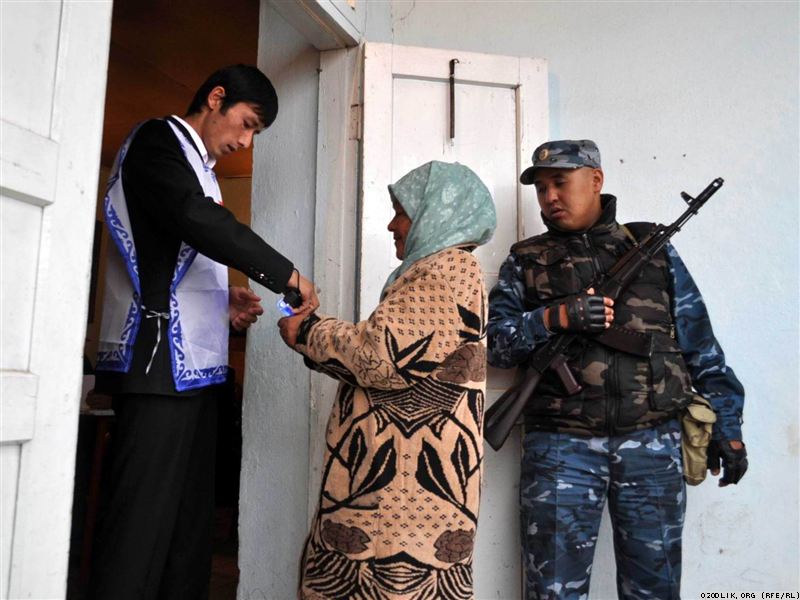
No Justice Following Ethnic Violence in Kyrgyzstan
Publication: Eurasia Daily Monitor Volume: 7 Issue: 198
By:

Approximately six months after the ethnic violence in Osh and Jalalabad, southern Kyrgyzstan remains relatively calm. Tensions, however, have now migrated into the local courtrooms, where the alleged criminals are on trial in a highly charge environment. Ethnic Kyrgyz and Uzbeks find themselves on the opposite sides of the courtroom, each identifying themselves as a victim of the June violence.
The aftermath of the four-day violence in June has revealed some of the worst traits of Kyrgyzstan’s judicial system and the underlying problems of the Kyrgyz police force. Overall, roughly 300 cases related to the June violence have been instigated, but only a selected number of them have reached the courts. The vast majority of the cases are stalled for various reasons –primarily because defendants, witnesses, and lawyers’ security are jeopardized and fearing further instability local judges refrain from taking responsibility over potentially explosive cases. On October 29, five ethnic Uzbek men were sentenced to life in prison for complicity in killing a policeman and his driver, both ethnic Kyrgyz, during the June violence (www.24.kg, October 29). Like other similar cases, this trial was postponed several times because of courtroom violence.
Amid the ongoing chaos and uncertainty in southern Kyrgyzstan, both the Uzbek and Kyrgyz population in southern Kyrgyzstan seem to agree that it is the provisional government to blame for failing to prevent the ethnic violence last June. Both the victims of violence and defendants do not trust the courts and seek to take justice into their own hands. There have been several cases where defendants and their relatives, ethnic Uzbeks, were attacked by the victim party, ethnic Kyrgyz. In one incident on October 13 in Osh court, the police, consisting mostly of ethnic Kyrgyz, was reluctant to defend ethnic Uzbek victims of attacks. Two Uzbek men were severely beaten and a woman was punched in the face (www.golosmeriki.us, October 13).
The case of Azimjan Askarov, an ethnic Uzbek rights activist, is perhaps a revealing example of the dysfunctional judicial system in Kyrgyzstan. Askarov was detained on June 15 for allegedly inciting inter-ethnic and religious hatred. Later, however, he was accused of organizing the inter-ethnic clashes and was sentenced to life in prison. According to Askarov’s lawyer, Nurbek Toktakunov, during detention Askarov was tortured and denied appropriate legal defense (www.akipress.kg, July 23). Toktakunov, an ethnic-Kyrgyz, has received threats from the affected party for defending an Uzbek.
Kyrgyz lawyers have repeatedly appealed to the government for protection. Most of them risk their lives in the interests of restoring justice despite the dysfunctional judicial system and corruption in the police force. Askarov’s case, along with five other defendants facing similar charges, is now being reviewed (www.fergana.ru, October 26) in Tash-Kumyr city court. Although some notable progress has occurred in the court procedures, not a single witness from the defendant’s side was able to attend the court hearings.
Meanwhile, some of the alleged instigators of the June violence –Osh Mayor and ethnic-Kyrgyz, Melis Myrzakhmatov, and renowned entrepreneur ethnic-Uzbek Kadyrzhan Batyrov– are still off-limits to the provisional government. The political and military leadership remain reluctant to sack Myrzakhmatov for his support among Osh police, while Batyrov is reportedly currently abroad. By sacking Myrzakhamtov now, the government risks weakening its control over Osh police units. Both Myrzakhmatov and Batyrov derive their leverage over the government from local support, while President Roza Otunbayeva’s approval rating remains low across southern Kyrgyzstan.
Kyrgyzstan’s government alone will not be able to develop the justice system in the south. Like the Kyrgyz police that was not trained to deal with such an avalanche of inter-ethnic tensions, the country’s courts are not ready to be ethnically-blind in the proceedings. Public shaming and blaming of the police and other demoralized law-enforcement structures will have a limited impact. The heavy presence of international observers might force the police and judges to become more impartial, while the most difficult cases must be held abroad.
Depending on how the newly elected parliament will form coalitions, new security officials might be more restrictive with Myrzakhmatov. Most of the ethnic Uzbek population expects Felix Kulov, the former KGB officer, to represent their rights as his party Ar-Namys received widespread support in the south, reportedly among ethnic Uzbeks. Since the elections, however, Kulov has not shown any inclination towards addressing the situation in the south. Although some victims of violence have given up on the idea that justice would be restored, any reconciliation efforts might prove to be futile unless criminals are punished.




